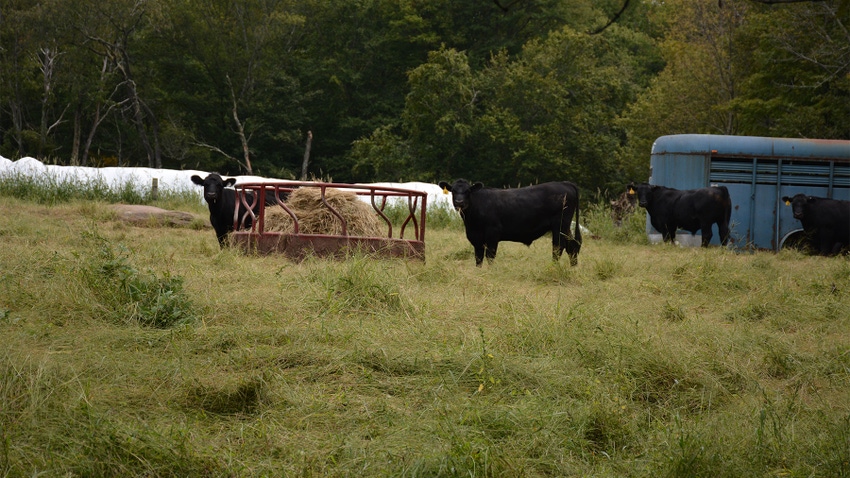February 8, 2024

Rodney Davis of Peaceful Terrain Farms in Huntingdon County, Pa., will talk about his farming practices at the annual Pennsylvania Forage and Grassland Council meeting.
The event is set for Feb. 28 at the Centre Hall Fire Station in Centre Hall, with registration at 8 a.m. and the program starting at 8:45 a.m.
Davis manages 90 acres of permanent pasture, 36 acres of first-cut hay and pasture and another 30 acres of sudangrass that he uses to feed his herd of more than 100 registered Angus brood cows.
He will share his experience from the past 20-plus years in a talk on operational management and strategies, and he will provide insight into his progressive and alternative grazing management.
Not only is the farm implementing intensive rotational grazing strategies of cow-calf pairs through the summer, but he also grazes both summer and winter annuals — emphasizing sudangrass and triticale or annual ryegrass.
Other topics for the program include:
“Building soil health in forage systems,” with Lisa Blazure, Stroud Water Research Center and Pennsylvania Soil Health Coalition
“Problem weed control in pastures and hayfields,” with Dwight Lingenfelter, senior Extension associate at Penn State
“Work and mission of the USDA-ARS National Plant Germplasm System,” with Brian Irish, curator, USDA Research
“3Rs of Forages — Reclamation, Renovation, Rejuvenation,” with Rodney Davis and Jessica Williamson
“Adjuvants vs. surfactants and pesticide resistance,” with Justin Brackenrich of Penn State Extension
This year's conference will also have two Pennsylvania Department of Agriculture Core and two Category PC — 01 and 18 credits — available, pending PDA approval.
This conference will provide information for farmers with years of experience making dry hay, haylage and grazing, and producers just getting started and looking to develop their skills.
Registration before Feb. 16 for Pennsylvania Forage and Grassland Council members costs $20, including lunch. Nonmembers are $40.
Walk-ins or registration paid after Feb. 16 will cost $30 for members and $50 for nonmembers.
Conference and registration information is available at the 2024 PA Forage Grassland Annual Conference registration website, or by emailing Terri Breon at [email protected].
Free memberships for Pa. Farm Link
Pennsylvania Farm Link is offering free land-linking database memberships until April 30, thanks to sponsor Horizon Farm Credit.
It is a $100 value that includes a profile on the Farm Link database, notifications for potential matches and an optional one-time social media promotion of your profile.
In 2023, there were 110 potential land-link matches with six completed transactions. The purpose of the land-linking database is to provide a space for beginning farmers and current landowners to showcase their purchase or lease opportunity in a manner that provides both security and confidentiality.
There are no names or addresses on the database, thus requiring anyone interested in a database profile to contact Pennsylvania Farm Link for additional information.
Information on a typical database profile includes general region desired or located, images, farming methods, acreage, farm type, and farm strategies.
If you need assistance completing your profile, Farm Link staff are available to assist. Land-linking database memberships can be completed online or via form in the mail.
For more information, email [email protected], call 717-705-2121 or visit pafarmlink.org.
NJ ManureLink launches
The New Jersey Department of Agriculture has partnered with Rutgers University to develop NJ ManureLink, a web-listing service designed to connect livestock producers with excess manure to composters and producers in need of manure.
Visit njmanurelink.rutgers.edu to list manure availability or to connect with producers in need of this valuable resource. The New Jersey Department of Agriculture’s Division of Agricultural and Natural Resources applied for and received a Conservation Innovation Grant from USDA’s Natural Resources Conservation Service for the NJ ManureLink project.
The website lists manure and compost availability by geographic location within the state. It also allows users to sign up for notifications when the resource they are looking for becomes available.
It provides an opportunity for farms with limited land capacity to distribute their manure to composters and farmers who can use it to benefit their operations.
The New Jersey Composting Council, a project partner, will provide outreach and support for educational components, including two webinars and two composting field days. The first webinar and field day are scheduled for July. Details on these sessions will be posted to njmanurelink.rutgers.edu.
Webinars will explore the importance of composting, nutrient management and how to effectively incorporate organic materials into farming practices. Field days will provide hands-on experience for setting up composting systems, monitoring progress and site considerations.
Read more about:
Land ManagementYou May Also Like




